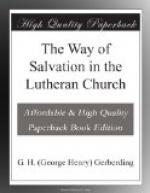CHAPTER III.
THE PRESENT, A DISPENSATION OF MEANS.
We have seen that the carnal, sinful nature of the child unfits it for the kingdom of heaven; that, therefore, there must be a change in that nature, even the birth of a new life, and the life of a new creature, before there can be either part or lot in the kingdom of God. We have also expressed our firm conviction that it is the good and gracious will of God in Christ to bestow upon the poor sin-sick and unholy child the Grace needed to so change it as to make it a partaker of His great salvation. We do not deem it necessary to stop to multiply scripture passages and arguments to prove this.
From beginning to end, the divine Word everywhere represents our God as a most loving, gracious, compassionate and tender Being. The tenor of the whole record is, that He delights in showing mercy, forgiving iniquity, and bestowing the Grace that bringeth salvation. He only punishes when justice absolutely demands it, and then reluctantly. It is not His will that any should perish.
Beyond controversy, God is willing to save the little helpless sufferers from sin, by making them subjects of His kingdom of Grace here, and thus of His kingdom of glory hereafter.
But can He? Is He able to reach down to that unconscious little child, apply to it the benefits of the atonement, impart to it the Grace of the new life, subdue the power of sin, and remove entirely its guilt? We are almost ashamed to ask such questions. And yet the humiliating fact is, that day by day, in every village and on every highway of our land, we can hear men and women, professing to be Christians and calling themselves members of Christ’s Church, gravely asserting that their Redeemer cannot so bless a little child as to change its sinful nature! If hard pressed, these persons, so wise in their own conceits, may admit that He can change a child’s nature if He so wills, but they still feel certain that he cannot do so through His own sacrament, instituted for that very purpose! Thus would they limit the Holy One of Israel, and say to Omnipotence: “Hitherto canst Thou come, but no farther.”
With such people, wise above what is written, knowing better than Christ, practically, even if not intentionally, charging the Son of God with folly, we desire no controversy. Let them overthrow the very foundations of redemption if they will. Let them argue that all things are not possible with God if they dare. We still prefer to believe that the Spirit of God can change, renew and regenerate the new-born child. In Matt. iii. 9, we read; “For I say unto you that God is able of these stones to raise up children unto Abraham,” i.e., as the connection shows, spiritual children of Abraham, true children of God.
We may not be able to understand the process by which God could change the rough, hard stones of the field into true children of God, but we believe it, because the Word says so. And believing that, it is not hard for us to believe that He can impart His own divine life to the heart of the child, and thus make it a new creature in Christ Jesus.




